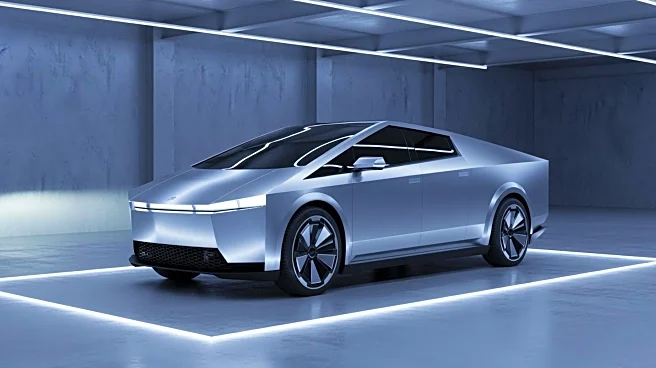What's Happening?
Tesla CEO Elon Musk has confirmed that the production of the company's autonomous Cybercab will commence in April 2026. This announcement was made during Tesla's 2025 Annual Shareholder Meeting. The Cybercab is designed as a fully autonomous vehicle,
marking Tesla's first model specifically built for unsupervised self-driving. The vehicle will feature a clean-slate design optimized for autonomy, lacking traditional components such as a steering wheel, pedals, or side mirrors. The Cybercab will be manufactured at Giga Texas and is set to become Tesla's flagship entry into the commercial robotaxi market. Musk emphasized that the Cybercab represents a significant step in integrating vehicle manufacturing, artificial intelligence, and mobility services. The production process for the Cybercab is modeled more closely on consumer electronics assembly, allowing for a production rate of one unit every ten seconds.
Why It's Important?
The introduction of the Cybercab is a pivotal development in the automotive and technology sectors, as it signifies a major advancement in autonomous vehicle technology. By eliminating traditional driving components, Tesla is pushing the boundaries of what is possible in vehicle design and manufacturing. This move could potentially disrupt the transportation industry by reducing the cost per mile of autonomous travel, making it more accessible to the public. The high production rate of the Cybercab, facilitated by its innovative manufacturing process, could lead to significant economic benefits for Tesla and set a new standard for the industry. Additionally, the success of the Cybercab could accelerate the adoption of autonomous vehicles, influencing public policy and regulatory frameworks around self-driving technology.
What's Next?
As Tesla prepares to start production in April 2026, the company will likely focus on refining its manufacturing processes and ensuring the Cybercab meets all regulatory requirements for autonomous vehicles. Stakeholders, including investors and industry analysts, will be closely monitoring Tesla's progress and the market's response to this new product. The success of the Cybercab could prompt other automakers to accelerate their own autonomous vehicle projects, potentially leading to increased competition in the robotaxi market. Additionally, regulatory bodies may need to adapt existing laws to accommodate the widespread use of fully autonomous vehicles.















